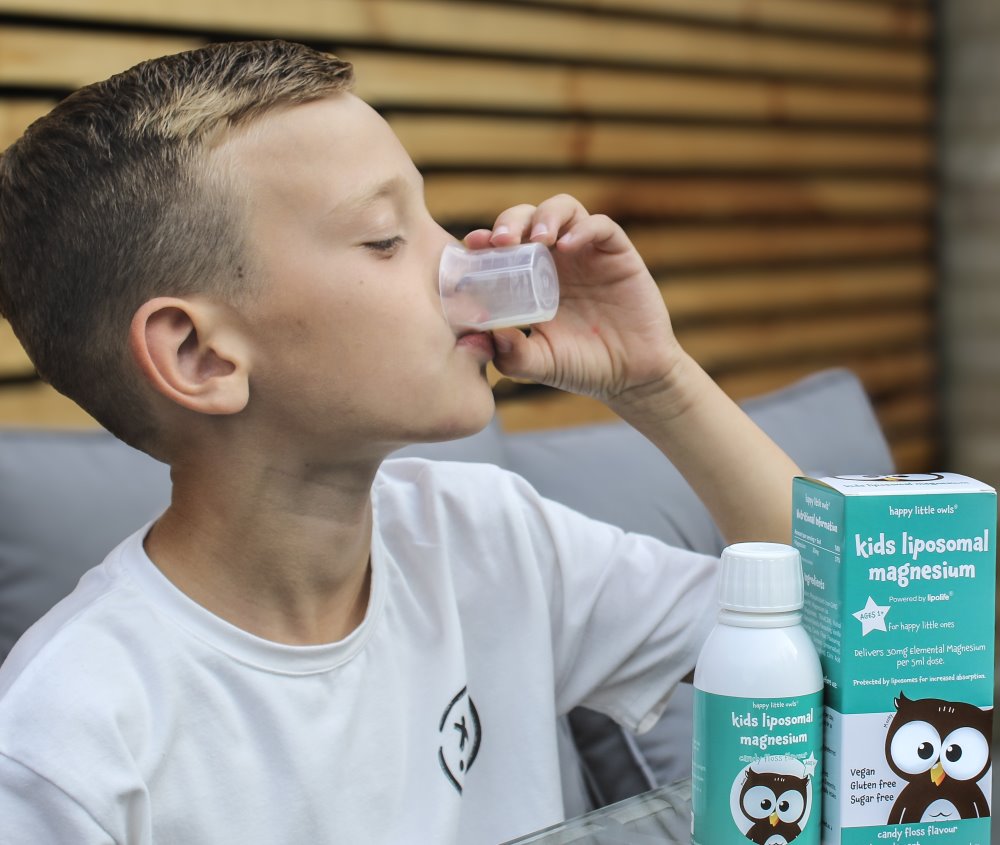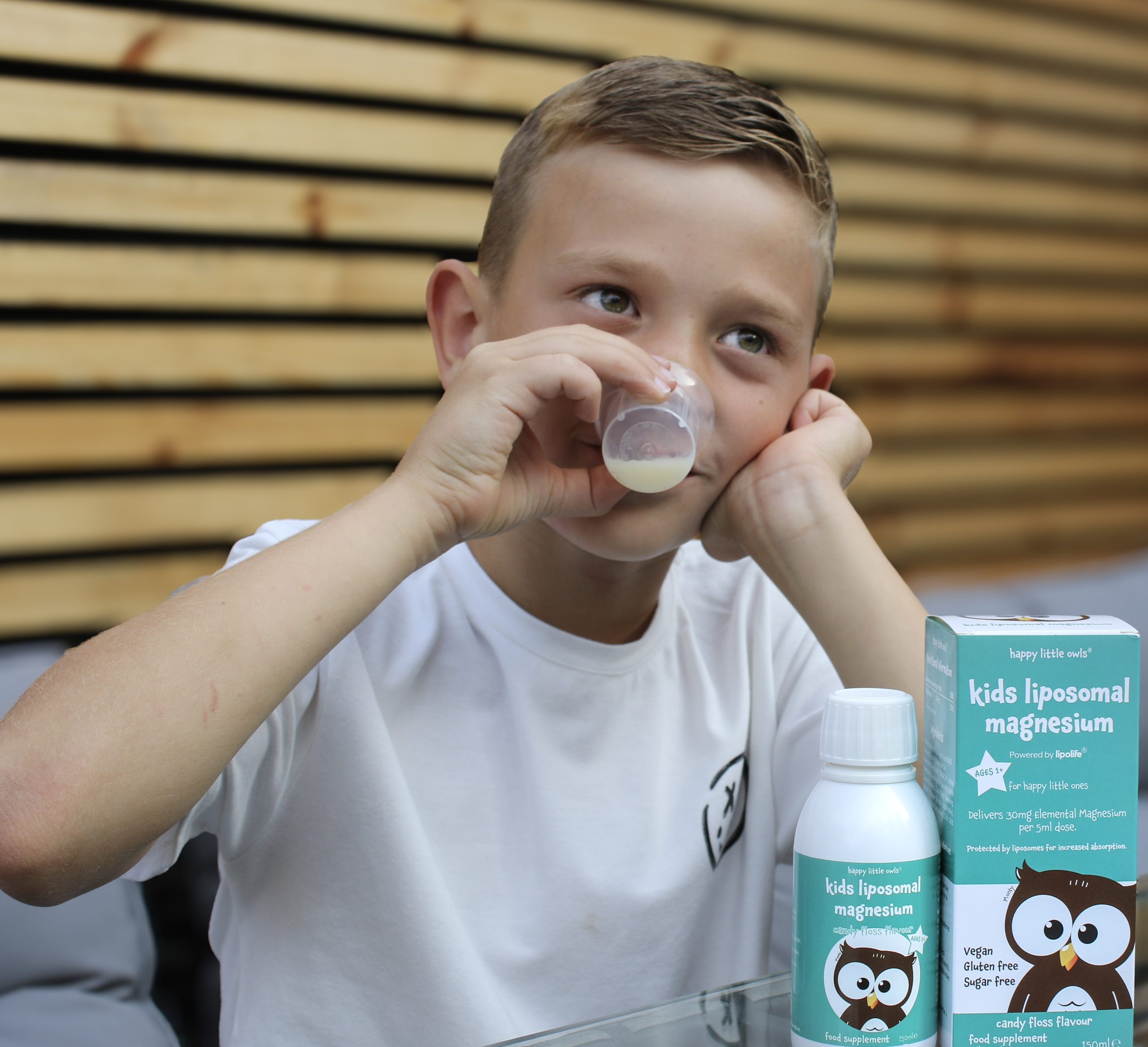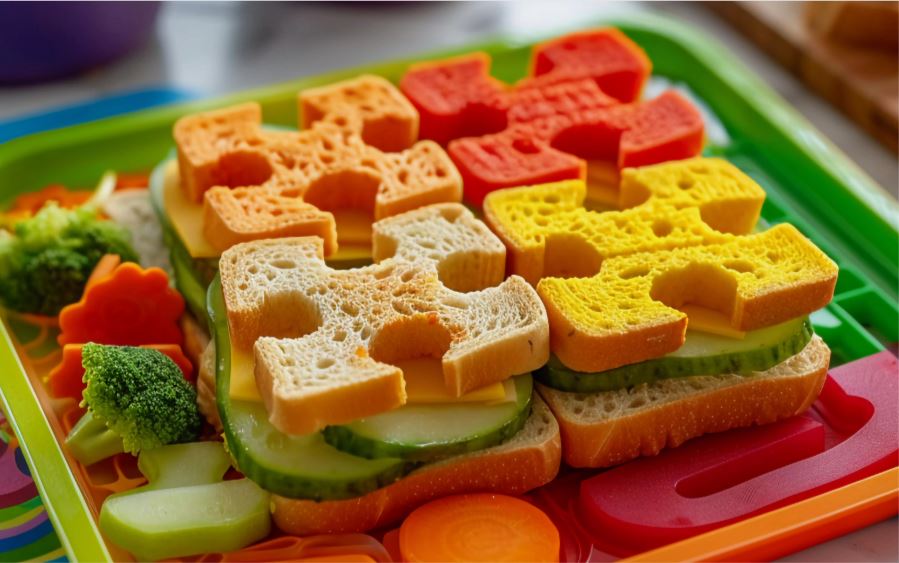Why “Magnesium for Kids” Matters and What Parents Should Know
As parents, we strive to give our children the nutrients they need to thrive. One mineral that’s often overlooked but plays a foundational role is magnesium. From sleep and mood to muscle function and bone health, magnesium supports a wide range of processes in growing bodies.
Yet studies and industry reports suggest many children may be falling short of optimal magnesium intake.
So, in today’s magnesium focussed hoot we’ll explore:
What magnesium does in children’s bodies
Signs your child might not be getting enough magnesium
Why liposomal magnesium can help with absorption
How Happy Little Owls® Kids Liposomal Magnesium fits into a smart supplement strategy
How to choose, dose and integrate magnesium safely
Let’s get into it.

1. What Magnesium Does in a Child’s Body
Magnesium is a “cofactor” in over 300 biochemical reactions. In children, some of its most relevant roles include:
Nervous system & mood regulation
Magnesium helps regulate neurotransmitters and supports GABA (a calming neural messenger). This helps children manage overstimulation and maintain emotional balance.Sleep and relaxation
Magnesium supports natural sleep rhythms and helps the nervous system wind down.Muscle & nerve function
It’s essential for healthy muscle contraction/relaxation and nerve signaling (helping reduce cramps, twitches, or restless legs).Bone and growth support
Magnesium works alongside calcium and vitamin D to support strong bones and overall growth.Energy metabolism
It plays a part in converting food into cellular energy – vital for active, growing kids.
Because magnesium is involved in so many systems, even a modest shortfall can ripple into issues like poor sleep, mood volatility, muscle tension — all things parents notice.
2. Signs Your Child Might Need More Magnesium
While overt magnesium deficiency is rare, suboptimal levels are common, especially in children whose diets include a lot of processed foods and low intake of whole, magnesium-rich foods.
Here are some red flags:
Difficulty falling asleep, frequent night-wakings or unrestful sleep
Agitation, irritability, emotional ups-and-downs
Muscle twitching or cramps
Fatigue or low energy
Sensory sensitivity or trouble focusing
Occasional digestive discomfort or irregularity
If you notice several of these signs, it’s worth examining diet first and then considering safe, well-absorbed magnesium support.
3. Why Liposomal Magnesium – and Why It’s a Wise Choice for Kids
One of the challenges with magnesium supplements is absorption. Many standard forms (oxide, some salts) have limited bioavailability or may cause gastrointestinal discomfort.
Liposomal delivery is an advanced approach. In simple terms:
The magnesium (often bisglycinate, a gentle chelated form) is enclosed in tiny phospholipid “bubbles” (liposomes), which help it survive digestion and reach cells more efficiently.
This tends to reduce digestive side effects and improve uptake at the cellular level.
For children, this means more reliable absorption with less fuss – no upset tummies or laxative effects.
Happy Little Owls® Kids Liposomal Magnesium uses a bisglycinate form with liposomal tech for maximal uptake.
Magnesium for kids is more than simply choosing any magnesium – the form and delivery system matter.
4. Introducing: Happy Little Owls® Kids Liposomal Magnesium
Happy Little Owls® Kids Liposomal Magnesium is specially designed for growing children
Key Features & Benefits
Gentle and child-friendly: It’s suitable from 1 year old.
Clear, sensible dosing: Each 5 ml serving provides 30 mg elemental magnesium.
Great taste: It’s flavoured “candy floss” – designed so kids accept it readily, no battles at bedtime.
Liposomal combined with bisglycinate formula: Means enhanced absorption and minimal digestive discomfort.
How Magnesium Fits Into a Healthy Bedtime Routine 🌙
* Best taken about 1 hour before bedtime, to support calm and restful sleep.
* Because the formulation is gentle and non-laxative, it can be used continuously (unless contraindicated).
* It complements, not replaces, a magnesium-rich diet (leafy greens, nuts, legumes, whole grains).
* Always pair supplementation with broader nutrition, hydration, movement and sleep hygiene practices.
5. Tips for Using Magnesium for Kids the Smart Way
To get the most from a magnesium protocol while keeping safety at the forefront, consider the following guidelines:
A. Check dietary sources first
Before supplementing, ensure your child’s diet includes magnesium-rich foods:
Dark leafy greens (spinach, Swiss chard)
Nuts & seeds (almonds, pumpkin seeds)
Legumes (beans, lentils)
Whole grains (oats, brown rice)
Some fruits (bananas, avocado)
Supplements are for “top-up” or bridging gaps, not full replacement.
B. Respect dosing & age recommendations
Happy Little Owls Magnesium 5ml dose delivers 30mg elemental magnesium.
Follow age/dose guidelines – don’t overdo it. Excess magnesium (especially from poor quality supplements) can lead to diarrhea, cramping, or electrolyte imbalance.
If your child uses medications (e.g. for ADHD, antidepressants, or other conditions), always check with a doctor or nurse practitioner before adding magnesium, as interactions may arise.
C. Monitor results and adjust as needed
Over a few weeks, observe:
Sleep quality: Does your child fall asleep more easily? Wake less?
Mood & calm: Is your child less reactive or more emotionally stable?
Physical signs: Fewer cramps, fewer twitches, more energy
Digestive comfort: Any signs of bowel looseness or GI upset?
If unwanted effects emerge, reduce dose or pause supplementation and consult a medical professional.
D. Be patient – consistency counts
Magnesium is not an instant “fix.” It often requires consistent daily intake and synergy with other supportive habits (nutrition, stress management and a strong sleep routine).
Kids Magnesium – Common Questions Parents Ask

Is magnesium safe for toddlers?
Yes, toddlers can take magnesium and supplementation may be considered if a doctor or healthcare professional suspects a dietary deficiency, though a balanced diet is always the preferred source. It’s crucial to consult a pediatrician, doctor or nurse practitioner before giving any supplements to ensure appropriate dosing.
Can magnesium make kids sleepy the next day?
In typical doses, a quality kids magnesium supplement supports restful sleep without daytime drowsiness. But always monitor tolerance and adjust timing.
How does liposomal magnesium compare to magnesium L-threonate or other forms?
While certain forms like magnesium L-threonate are being explored for cognitive effects, liposomal magnesium bisglycinate is the Happy Little Owls choice for effective absorption and digestive gentleness.
How long should a child take magnesium?
There’s no universally fixed timeline for how long kids, or adults, should take magnesium. Many children use magnesium supplements long-term, especially if dietary gaps persist. Remember, magnesium is involved in more than just sleep – perhaps mum and dad could use some too!
Making “Magnesium for Kids” Truly Work
The phrase “magnesium for kids” isn’t just a keyword. It reflects an important conversation about ensuring children get the full spectrum of mineral support – especially in an era of processed diets and busy lives.
With a thoughtful, bioavailable supplement like Happy Little Owls® Kids Liposomal Magnesium, you can bridge gaps safely and effectively. But the real magic happens when you combine our supplements with:
Whole-food nutrition
Sleep hygiene and routine
Hydration and stress balance
Movement, fresh air and optimal gut health
🦉 Magnesium for Kids Final Hoot: Safety, Transparency & Our Commitment in Light of the UK Melatonin-Gummies Alert
At Happy Little Owls, we are deeply concerned about the recent UK regulator warning involving Nutrition Ignition Kids Magnesium Glycinate Gummies, which were found to contain undeclared melatonin, a prescription-only substance in the UK.
Here’s our official response and a reaffirmation of our commitment to safety, transparency and trust:
What Happened (Brief Recap)
The UK Medicines & Healthcare products Regulatory Agency (MHRA) has advised parents and caregivers to stop using the Nutrition Ignition gummies immediately, after independent testing revealed the presence of melatonin not listed on the label.
Melatonin is a prescription-only medicine in the UK. Any product containing it must be regulated as a medicine and hold a proper licence.
The investigation is ongoing. The MHRA is assessing appropriate regulatory action.
The reporting and testing were prompted by concerns raised by parents whose children experienced stronger than expected sleep effects from the “magnesium” gummies.
Our Position & Response
Safety Is Our Non-Negotiable Priority
We hold ourselves to the highest standards of ingredient transparency, regulatory compliance and rigorous quality control. The idea that a product marketed for children would contain an undisclosed, prescription-only substance is unacceptable.Complete Ingredient Transparency
All ingredients in our products are fully declared and we never include hormones, prescription-only actives or any hidden or undeclared substances. We welcome independent testing by credible third parties as needed to validate integrity.Regulatory Compliance & Best Practices
We proactively ensure our formulations comply with UK & EU regulations, including food supplement laws, safety thresholds, labelling standards and manufacturing practices.Open Communication & Customer Trust
If any customer ever has concerns about the contents of our products, we encourage them to reach out immediately. We promise to investigate promptly, share findings transparently and take corrective action if needed.Educating & Protecting Families
This incident highlights the risks in an industry where supplements are under-regulated or mislabelled. We urge parents to look for:Full, clear labels
Brands willing to share certificates of analysis (COAs)
Third-party testing or verification
Magnesium for kids – what a parent or caregiver can do
Discontinue use of any magnesium gummies or supplements that seem to make your child unusually drowsy or whose labels don’t clearly list all ingredients.
Check for notices from MHRA, company websites, or trusted health regulators.
Report adverse reactions via the MHRA Yellow Card scheme if your child exhibits symptoms like excessive sleepiness, dizziness, nausea or behavioural changes.
Choose trusted brands with open testing and clear ingredient labels.
Consult your medical practitioner or a pharmacist before starting or continuing any supplement, especially for children or when other medications are in use.
We understand the shock, worry and fear this news may cause among parents. Our mission has always been to support children’s health transparently, gently and safely.
We recommit today to that mission.




